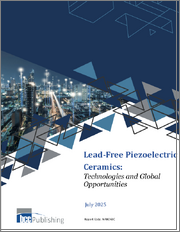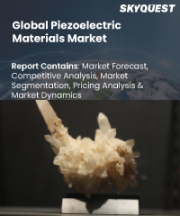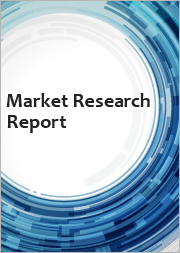
|
시장보고서
상품코드
1782079
무연 압전 세라믹 시장(2025년) : 각종 기술 및 기회Lead-Free Piezoelectric Ceramics: Technologies and Global Opportunities |
||||||
세계의 무연 압전 세라믹 시장 규모는 2025년 3억 730만 달러에서 예측 기간 동안 CAGR 12.3%로 추이하고, 2030년 말에는 5억 4,980만 달러에 달할 것으로 예측되고 있습니다.
아시아태평양 시장은 2025년 1억 6,450만 달러에서 예측 기간 동안 CAGR 14.2%로 추이하고, 2030년 말에는 3억 1,910만 달러에 달할 것으로 예측되고 있습니다. 북미 시장은 2025년 7,470만 달러에서 예측 기간 동안 CAGR 11.2%로 추이하고, 2030년 말에는 1억 2,710만 달러에 달할 것으로 예측되고 있습니다.
본 보고서에서는 세계의 무연 압전 세라믹 시장을 조사했으며, 시장 개요, 시장 영향요인 및 시장 기회의 분석, 시장 규모 추이와 예측, 각종 구분, 지역별 상세 분석 등을 정리했습니다.
목차
제1장 주요 요약
- 시장 전망
- 조사 범위
- 시장 요약
- 시장 역학과 촉진요인
- 동향과 미래의 전개
- 부문별 분석
- 지역 시장 및 신흥 시장
- 결론
제2장 시장 개요
- 의미
- 업계 시나리오
- 무연 압전 세라믹의 개발 필요성
- 무연 압전 세라믹의 특성
- 무연 압전 세라믹의 용도
- 준비 기술
- 규칙
- EU의 유해물질 제한 지령(RoHS) 면제 규정
- REACH 규칙
- 미중관세전쟁의 영향
- 공급망 분석
- Porter's Five Forces 분석
제3장 시장 역학
- 시장 역학
- 시장 성장 촉진요인
- 납계 압전 재료의 건강과 환경에 대한 위험
- 바람직한 규제 환경
- 무연 압전 세라믹의 용도
- 시장의 과제
- 원재료의 추출에 수반하는 환경 리스크
- 퍼포먼스상의 제약
- 시장 기회
- 나노압전 세라믹
- 웨어러블 기술
제4장 신기술과 개발
- 개요
- 재료와 기술의 동향
제5장 시장 세분화 분석
- 세분화의 내역
- 조사결과 및 요약
- 시장 분석 : 재료별
- 니오브산 칼륨 나트륨(KNN)
- 티타네이트 비스무트 나트륨(BNT)
- 티타네이트 바륨
- 기타
- 시장 분석 : 구성별
- 단층
- 다층
- 박막
- 시장 분석 : 최종 사용자별
- CE 제품 및 옵토일렉트로닉스
- 수송
- 산업기기
- 의료기기
- 기타
- 지리적 내역
- 조사결과 및 요약
- 시장 분석 : 지역별
- 북미
- 아시아태평양
- 유럽
- 기타 지역
제6장 경쟁 정보
- 경쟁 시나리오
- 기업 포지셔닝
- 전략적 노력
제7장 무연 압전 세라믹 산업의 지속가능성 : ESG의 관점
- ESG 목표
- ESG상의 과제
- ESG 성능 분석
- 환경 문제
- 사회문제
- 거버넌스 문제
- ESG의 현상
- 결론
제8장 부록
- 조사 방법
- 정보원
- 약어
- 참고문헌
- 기업 프로파일
- CERAMTEC GMBH
- CTS CORP.
- FUJI CERAMICS CORP.
- HONDA ELECTRONICS CO. LTD.
- IONIX AT
- KEMET CORP.
- KYOCERA CORP.
- NITERRA CO. LTD.
- NINGBO FBELE ELECTRONICS CO. LTD.
- PI CERAMIC GMBH
- PZT ELECTRONIC CERAMIC CO. LTD.
- SEIKO EPSON CORP.
- SUMITOMO CHEMICAL CO. LTD.
- TANIOBIS
- ZIBO YUHAI ELECTRONIC CERAMIC CO. LTD.
The global market for lead-free piezoelectric ceramics is projected to grow from $307.3 million in 2025 to reach $549.8 million by the end of 2030, at a compound annual growth rate (CAGR) of 12.3% from 2025 through 2030.
The Asia-Pacific market for lead-free piezoelectric ceramics is projected to grow from $164.5 million in 2025 to reach $319.1 million by the end of 2030, at a CAGR of 14.2% from 2025 through 2030.
The North American market for lead-free piezoelectric ceramics is projected to grow from $74.7 million in 2025 to reach $127.1 million by the end of 2030, at a CAGR of 11.2% from 2025 through 2030.
Report Scope
This report provides a qualitative as well as quantitative assessment of the global market for lead-free piezoelectric ceramics. It uses 2024 as the base year and provides revenue forecasts from 2025 to 2030 (USD thousands). The report analyzes the market in the following segments:
- By material.
- Potassium sodium niobate (KNN).
- Bismuth sodium titanate (BNT).
- Barium Titanate (BT).
- Others.
- By configuration.
- Monolith.
- Multilayer.
- Thin films.
- By end user.
- Consumer electronics and optoelectronics.
- Transportation.
- Industrial equipment.
- Medical.
- Others.
- By Region.
- Asia-Pacific: China, Japan, South Korea and Rest of APAC.
- Europe: Germany, France, Italy and Rest of Europe.
- North America: U.S., Canada and Mexico.
- Rest of the World: South America, and the Middle East and Africa.
Report Includes
- 51 data tables and 44 additional tables
- An analysis of the global market for lead-free piezoelectric ceramics (LFPECs), including materials, applications and fabrication processes
- Analyses of the global market trends, with revenue data from 2024, estimates for 2025, forecast for 2029 and projected CAGRs through 2030
- Estimates of the market's size and revenue prospects, accompanied by a market share analysis based on material type, configuration, end-user industry and region
- Facts and figures pertaining to market dynamics, technological advancements, regulations, industry structure and the impacts of macroeconomic variables
- Review of the current market status for Pb-free piezoelectric ceramic products, key technology issues, competitive scenario and R&D activities
- Insights derived from Porter's Five Forces model and global value chain analysis
- An analysis of U.S. patents across each major category, and emerging trends and developments in patent activity
- Overview of sustainability trends and ESG developments, with emphasis on consumer attitudes, and the ESG scores and practices of leading companies
- Analysis of the industry structure, including companies' market shares and rankings, strategic alliances, M&A activity and a venture funding outlook
- Profiles of the leading companies, including CTS Corp., PI Ceramic GmbH, Niterra Co. Ltd., Kyocera Corp., and Sumitomo Chemical Co. Ltd.
Table of Contents
Chapter 1 Executive Summary
- Market Outlook
- Scope of Report
- Market Summary
- Market Dynamics and Drivers
- Trends and Future Developments
- Analysis by Segment
- Regional and Emerging Markets
- Conclusion
Chapter 2 Market Overview
- Definition
- Industry Scenario
- Need for Developing Lead-Free Piezoelectric Ceramics
- Characteristics of Lead-Free Piezoelectric Ceramics
- Applications of Lead-Free Piezoelectric Ceramics
- Preparation Techniques
- Regulations
- EU Restriction of Hazardous Substances Exemption
- REACH
- Implications of U.S.-China Tariff War
- Supply Chain Analysis
- Suppliers of Raw Materials
- Lead-Free Piezoelectric Ceramics Manufacturers
- Distribution
- Lead-Free Piezoelectric Device Manufacturers
- End Users
- Porter's Five Forces Analysis
- Bargaining Power of Buyers
- Bargaining Power of Suppliers
- Potential for New Entrants
- Threat of Substitutes
- Level of Competition in the Industry
Chapter 3 Market Dynamics
- Market Dynamics
- Market Drivers
- Health and Environmental Risks of Lead-Based Piezoelectric Materials
- Favorable Regulatory Environment
- Applications of Lead-Free Piezoelectric Ceramics
- Market Challenges
- Environmental Risks Associated with Raw Material Extraction
- Performance Constraints
- Market Opportunities
- Nano-Piezoelectric Ceramics
- Wearable Technology
Chapter 4 Emerging Technologies and Developments
- Overview
- Material and Technological Trends in Materials and Technology
Chapter 5 Market Segmentation Analysis
- Segmentation Breakdown
- Findings/Takeaways
- Market Analysis by Material
- Potassium Sodium Niobate (KNN)
- Bismuth Sodium Titanate (BNT)
- Barium Titanate
- Others
- Market Analysis by Configuration
- Monolith
- Multilayer
- Thin films
- Market Analysis by End User
- Consumer Electronics and Optoelectronics
- Transportation
- Industrial Equipment
- Medical Devices
- Other Industries/Sectors
- Geographic Breakdown
- Findings/Takeaways
- Market Analysis by Region
- North America
- Asia-Pacific
- Europe
- Rest of the World (RoW)
Chapter 6 Competitive Intelligence
- Competitive Scenario
- Company Positioning
- Strategic Initiatives
Chapter 7 Sustainability in the Lead-Free Piezoelectric Ceramics Industry: ESG Perspective
- ESG Goals
- ESG Issues
- ESG Performance Analysis
- Environmental Issue
- Social Issue
- Governance Issue
- Current Status of ESG
- Conclusion
Chapter 8 Appendix
- Methodology
- Information Sources
- Abbreviations
- References
- Company Profiles
- CERAMTEC GMBH
- CTS CORP.
- FUJI CERAMICS CORP.
- HONDA ELECTRONICS CO. LTD.
- IONIX AT
- KEMET CORP.
- KYOCERA CORP.
- NITERRA CO. LTD.
- NINGBO FBELE ELECTRONICS CO. LTD.
- PI CERAMIC GMBH
- PZT ELECTRONIC CERAMIC CO. LTD.
- SEIKO EPSON CORP.
- SUMITOMO CHEMICAL CO. LTD.
- TANIOBIS
- ZIBO YUHAI ELECTRONIC CERAMIC CO. LTD.



















